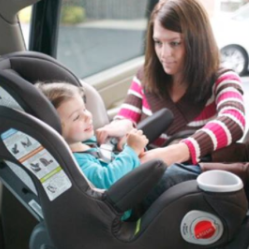By Madison Coker

KU Statehouse Wire Service
TOPEKA — Child safety advocates gathered in the House Judiciary Committee meeting last week to support a bill that they say would help decrease child fatalities in car accidents.
HB2077 would protect people who perform inspections, install or adjust child safety seats if there was an injury caused by a car seat malfunction. The bill also limits civil liability for people who educate others on how to install or adjust a child safety seat.
The people who perform these tasks are certified passenger safety technicians and they specialize in car seats for young children.
Kansas has 641 certified child passenger safety technicians (CPST), but Safe Kids Kansas member Teresa Taylor said that number is too low.
“The goal of this bill is to recruit more certified passenger safety technicians and to offer more services to the community,” Taylor said.
Taylor said people are wary of getting the certification to become a technician because of the potential liability issues. Proponents expect this bill would eliminate those worries and encourage others to complete the training.
According to the Kansas Traffic Safety Office, a neutral party on this bill, child safety seats have been shown to reduce fatal injury by 71 percent for infants and 54 percent for toddlers.
The National Highway Safety Administration says more than 46 percent of the child seats are installed incorrectly.
The Kansas Traffic Safety Office reports that Kansas has 118 Child Passenger Safety Inspection Stations that aim to provide help with car seat installation. In 2016, the stations assisted over 1,900 low-income families by providing them with car seats for their children as well as seat training.
Rachel Ault, a registered nurse for Stormont Vail Health and a CPST, testified in favor of the bill. Ault said she felt compelled to do her part, because she frequently deals with children with preventable injuries caused by improper seat installations.
“Right now, companies are hesitant to get involved in helping certified passenger safety technicians,” Ault said. “Stormont Vail said if this bill passed, they would join the cause.”
Stormont Vail Health submitted a written testimony saying, “with the passing of this legislation, Stormont Vail Health intends to develop a Child Passenger Safety program to provide this needed resource to the families we serve.”
There were no opponents to the bill. However, Rep. John Carmichael (D-Wichita) expressed some concerns about who would be affected by the bill.
“Why wouldn’t you want an inspector to be responsible for their negligence like lawyers, doctors and everyone else?” Carmichael asked.
Proponents said the technicians receive extensive training through a four-day program with required continuing education. They said this program is enough to justify the technicians’ case and the liability should be assumed by the people involved in the car accidents and car manufacturers.
The bill states it does not apply to “civil actions for damages resulting from gross negligence or willful misconduct.”
Now, committee members will discuss amending the language of the bill to only apply to cases of negligence so it does not limit as many cases.
Madison Coker is a University of Kansas junior studying journalism from Kansas City.
